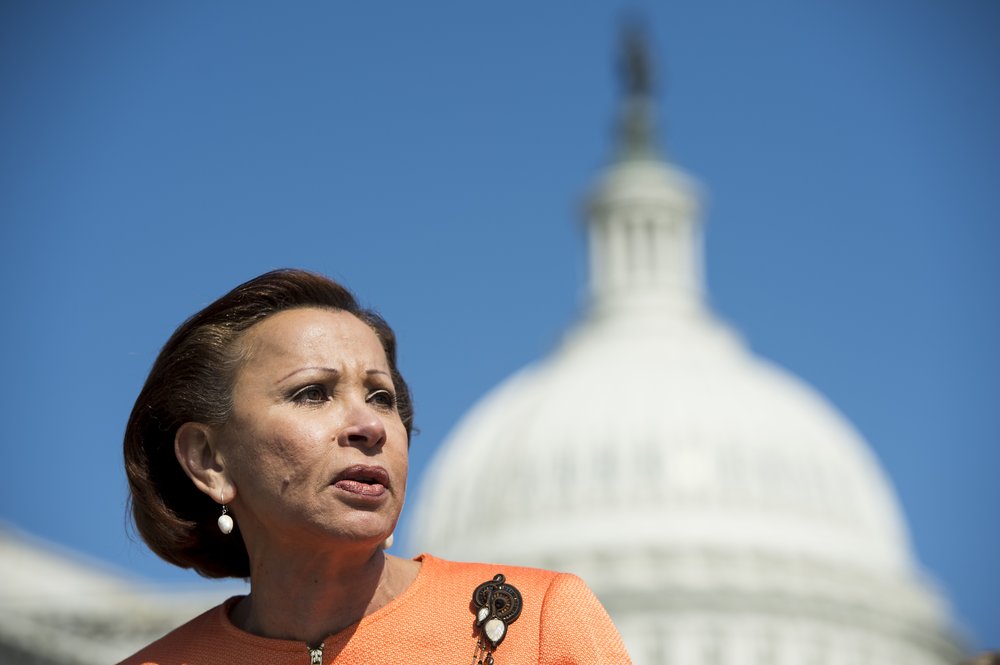NY Rep. Nydia Velázquez takes aim at landlords fueling US housing crisis
March 7, 2023, 6:01 a.m.
Rep. Nydia Velázquez is introducing legislation to ban source of income discrimination and penalize property owners who deliberately keep units off the market.

Rep. Nydia Velázquez wants the federal government to crack down on landlords she says are exacerbating a nationwide affordable housing crisis.
The Brooklyn Democrat is introducing legislation Tuesday that would amend the Fair Housing Act to ban discrimination against people with rental assistance vouchers and fine property owners $100,000 every month that they are found to “deliberately” leave an apartment empty, she told Gothamist.
Warehousing units or denying apartments to voucher-holders — a practice known as "source of income discrimination" — drives up rents and forces people into homelessness or unstable housing arrangements, Velázquez said..
“In order to end homelessness as we know it, we have to provide shelter,” Velàzquez said in an interview. “We have to empower families to be able to afford and find affordable housing in New York City.”
Velázquez is putting forward the proposal amid what she says is a crisis on her home turf. More than 88,000 rent-stabilized apartments sat vacant in 2021, as the coronavirus pandemic took its toll on the economy and people working in the hardest-hit industries.
That number has since decreased, but for Velázquez, the same issue is at stake: Without affordable housing, she said, “no city can survive.”
“For every family that we kept in their homes, there are 20, 30 others that are struggling,” she said.
Velázquez’s “Landlord Accountability Act” comes as nationwide homelessness surges and the country faces a 5.8% rental vacancy rate. That margin is much slimmer for apartments affordable to the lowest-income Americans.
In New York City, less than 1% of apartments priced below $1,500 a month were empty and available for rent at the time of the city’s most recent vacancy survey last spring. At the same time, property owners are holding tens of thousands of rent-stabilized units off the market — either because they’re not finding it profitable to renovate and rent them out again, or because they cannot afford the costs. Velázquez’s bill would create a nationwide enforcement program and establish a tax credit for owners who rehab low-income housing units.
Meanwhile, many of the country’s 2.2 million Section 8 recipients are struggling to find apartments, even though their vouchers guarantee a consistent monthly payment to landlords.
“In a city like New York with a high cost of housing, imagine the stress and the pressure that these families are under,” Velázquez said.
Section 8 recipients qualify based on their income — they pay 30% of their earnings toward rent, with the government covering the remainder. They are disproportionately people of color, people with disabilities or families headed by a single mother; populations now covered by the federal Fair Housing Act. Velázquez’s bill would add “source of income” to those protected classes.
Despite New York City laws prohibiting landlords and agents from denying apartments to people with rental subsidies, source of income discrimination remains the most common housing complaint recorded by the city’s Commission on Human Rights.
The Center on Budget Policies and Priorities finds that laws banning source of income bias strengthen programs like Section 8, allowing recipients to secure apartments while guaranteeing consistent payments to landlords.
Source of income discrimination is already illegal under New York State law, but 31 states lack similar protections for would-be renters. Velázquez’s bill would impose a uniform ban nationwide and direct $140 million to enforcement and awareness programs.
Some landlords and their representatives say they would be eager to take in voucher holders, especially as the COVID-19 pandemic stopped many tenants from paying rent on time or consistently. But onerous application and approval processes can delay or cancel moves, especially when it comes to the city’s voucher program.
Velázquez said most property owners comply with the regulations, but those who don’t need to be held accountable.
“This type of legislation is not intended to hurt those landlords that are playing by the rules,” she said. “But there are some who do not, and have responded by keeping their units empty. And that is not right.”